Overview
This article highlights essential strategies for implementing effective discrete trials in Applied Behavior Analysis (ABA) therapy, focusing on structured learning and progress tracking. It’s important to recognize how these methods can enhance skill acquisition and foster independence among individuals with autism.
Parents often face challenges in this journey, and understanding these strategies can make a significant difference in their child's development. Evidence shows that these approaches have positive long-term impacts on social skills and overall quality of life. By embracing these techniques, families can create a nurturing environment that supports their loved ones’ growth and well-being.
Introduction
In the world of Applied Behavior Analysis (ABA) therapy, the path to effective learning and skill acquisition is both intricate and rewarding. ASD Media is here to empower parents and professionals, providing essential resources and insights to help navigate the complexities of ABA. This article explores the transformative power of Discrete Trial Training (DTT), a structured approach that breaks down skills into manageable steps, ensuring that children with autism and ADHD can truly thrive.
From fostering independence to enhancing social skills, the techniques and strategies discussed here highlight the importance of community support and underscore the long-term benefits of tailored interventions. As the landscape of ABA therapy evolves, understanding these methods becomes crucial for unlocking the potential of every child. We invite you to join us on this journey, as together, we can make a meaningful difference in the lives of those we care about.
About ASD Media: Empowering Parents and Professionals in ABA Therapy
At ASD Media, we are deeply committed to advancing the implementation of Applied Behavior Analysis (ABA) therapy using discrete trials. Our goal is to offer valuable insights and strategies that address common challenges and improve outcomes for families and professionals alike. We provide a wealth of resources tailored for both parents and practitioners, fostering a supportive and inclusive community where experiences can be shared, and learning is encouraged. By subscribing to our newsletter, you gain access to the latest news, including articles, guides, and tools, as well as unlimited digital resources, empowering you to stay informed and engaged.
Our mission is to unlock the potential of youth with autism and ADHD through effective strategies that help manage challenging behaviors, navigate support services, and enhance social development. It’s noteworthy that 91% of autism professionals recognize person-centered approaches as the most effective in delivering ABA therapy. This underscores the importance of community support in this journey.
Recent studies, such as the case study titled 'How ABA Therapy Teaches Daily Living Abilities,' highlight the effectiveness of ABA therapy using discrete trials to teach essential daily living skills, which are crucial for fostering independence among autistic individuals. This aligns perfectly with our goal of equipping parents and professionals with the necessary tools to promote autonomy and growth. As Dr. Brenda Smith Myles wisely states, "Autism is part of the child, not something that happened to them or that can be separated from who they are." This emphasizes the need for a holistic approach in supporting children with autism.
Through our initiatives, ASD Media not only provides resources but also cultivates a community that encourages collaboration and shared learning. Together, we can enhance the overall effectiveness of ABA therapy by utilizing discrete trials and reinforcing the vital role of community support. We invite you to join us in this important mission, sharing your experiences and insights as we work together to make a difference.
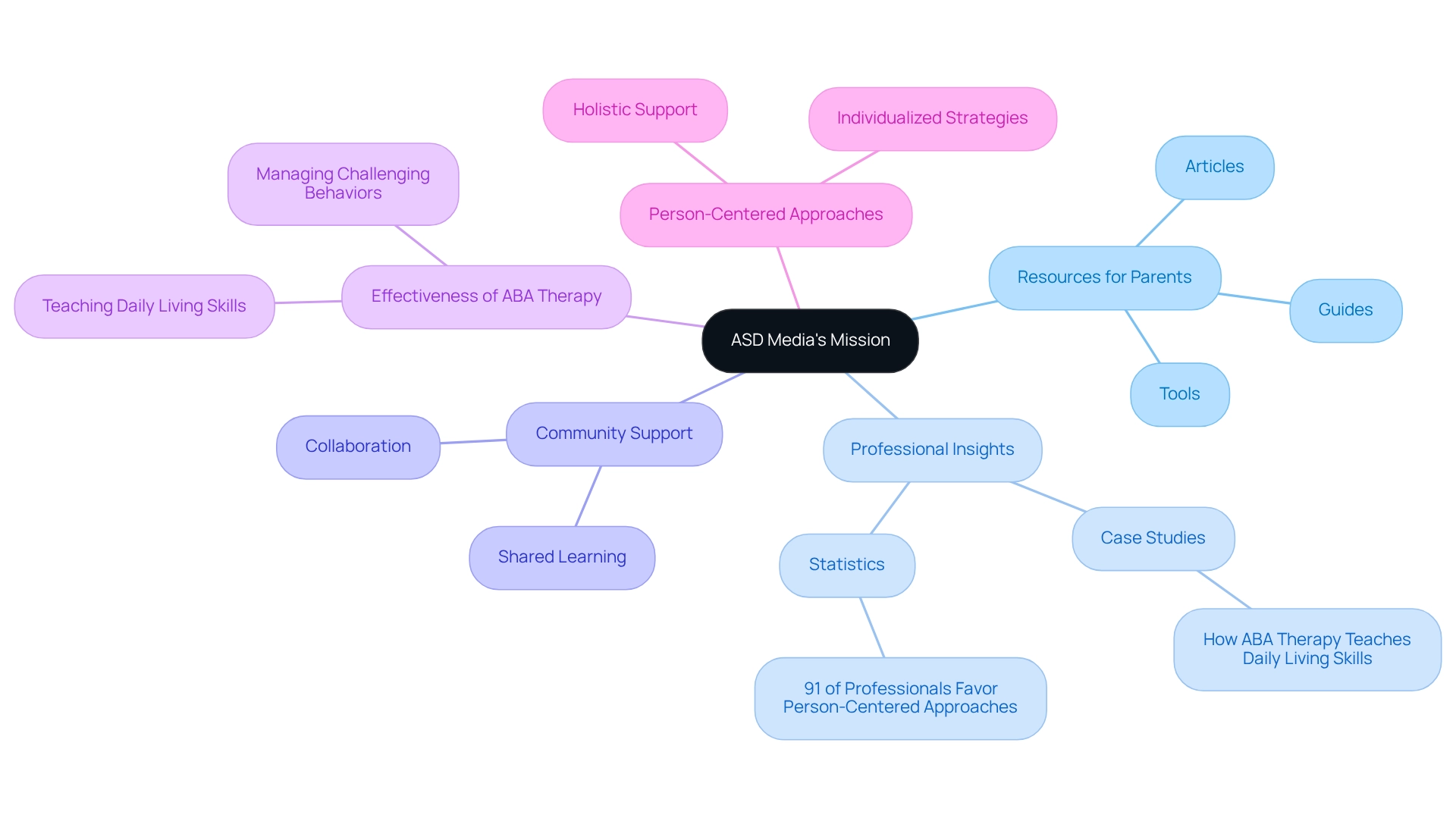
Structured Learning: Enhancing Skill Acquisition Through Discrete Trial Training
Discrete trials are a highly structured ABA method that breaks down abilities into small, manageable parts, enabling trainers to instruct systematically. This approach emphasizes one ability at a time through discrete trials, allowing learners to focus on mastering each skill before moving forward. By providing clear guidance and consistent support through discrete trials, DTT significantly enhances the learning experience and fosters effective ability acquisition.
In contrast, only 0% to 13% of study records indicated no change. This data underscores the effectiveness of structured learning methods such as discrete trials, which can make a real difference in the lives of learners. Moreover, evidence-based practices in ABA highlight the importance of tailoring interventions to meet individual needs. This ensures that DTT is not only effective but also ethical and centered around the client’s unique circumstances.
As we observe the long-term impacts of ABA therapy on individuals with ASD, the results are promising. Success stories abound, showcasing how discrete trials have led to substantial knowledge acquisition in youth with autism. This emphasizes its vital role as a foundation of effective ABA therapy, especially through discrete trials; if you are a parent seeking support or resources, consider exploring discrete trials further. It is a compassionate approach that not only addresses the challenges faced by learners but also nurtures their potential.
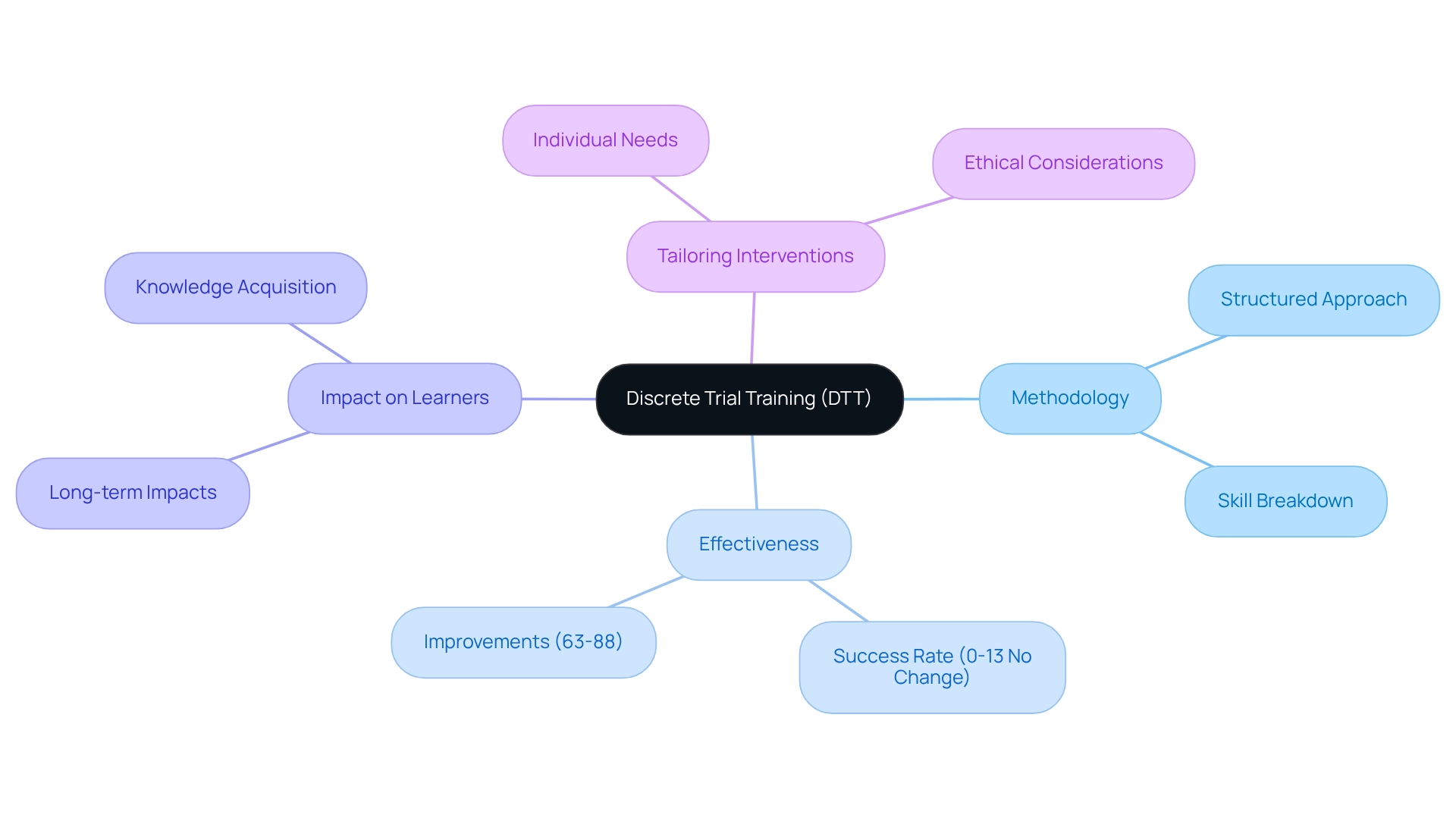
Measurable Progress: Tracking Success in Discrete Trial Training
In discrete trials, tracking progress is not just a necessity; it’s a lifeline for evaluating the effectiveness of the training. By employing data collection methods such as frequency counts and percentage correct, therapists can closely monitor learners' responses during trials. This systematic approach not only assesses success but also guides essential modifications to teaching strategies, ensuring that each student receives the personalized support they deserve. Recent findings reveal that students can successfully request an object in 8 out of 10 trials, highlighting the potential of structured data collection in enhancing skill acquisition.
However, while DTT offers structured learning and precise progress tracking, it does require significant time and resources—something that may not be feasible for every family. Therefore, it’s crucial to adopt a balanced strategy that includes spontaneous communication opportunities. These structured guidelines can significantly improve the effectiveness of DTT for individuals on the autism spectrum. By incorporating these strategies, practitioners can truly enhance the impact of DTT, ultimately promoting better outcomes for individuals on the autism spectrum. Let's work together to ensure every child receives the support they need to thrive.
![]()
Reinforcement Strategies: Motivating Learners in Discrete Trial Training
Effective reinforcement strategies are vital for motivating learners in discrete trials. Positive reinforcement methods—like verbal praise, token systems, or access to preferred activities—can significantly enhance a young person's motivation to engage in learning tasks. Imagine the joy a child feels when they receive praise for their efforts; research shows that consistent rewards for correct answers help cultivate a positive learning atmosphere. This not only boosts engagement but also encourages the repeated practice essential for mastery.
As we look ahead to 2025, the focus on reinforcement strategies continues to evolve. There is a growing emphasis on tailoring these strategies to individual needs, enhancing their effectiveness. Successful case studies, such as 'Overcoming Challenges in DTT Implementation,' illustrate that when therapists implement motivational strategies alongside proactive behavior management during discrete trials, they can effectively tackle challenges like maintaining learner motivation and managing behaviors. This holistic approach leads to improved communication, social interaction, and overall behavior management for children with autism.
Moreover, statistics indicate that DTT has generated many success stories, enhancing communication, social interaction, daily living abilities, academic performance, and behavior management. This approach aligns with current trends in ABA therapy and underscores the critical role of positive reinforcement in shaping desired behaviors and outcomes. As noted in the field of Applied Behavior Analysis (ABA), "reinforcement plays a crucial role in shaping and promoting desired behaviors." Together, we can foster an environment where every child flourishes.
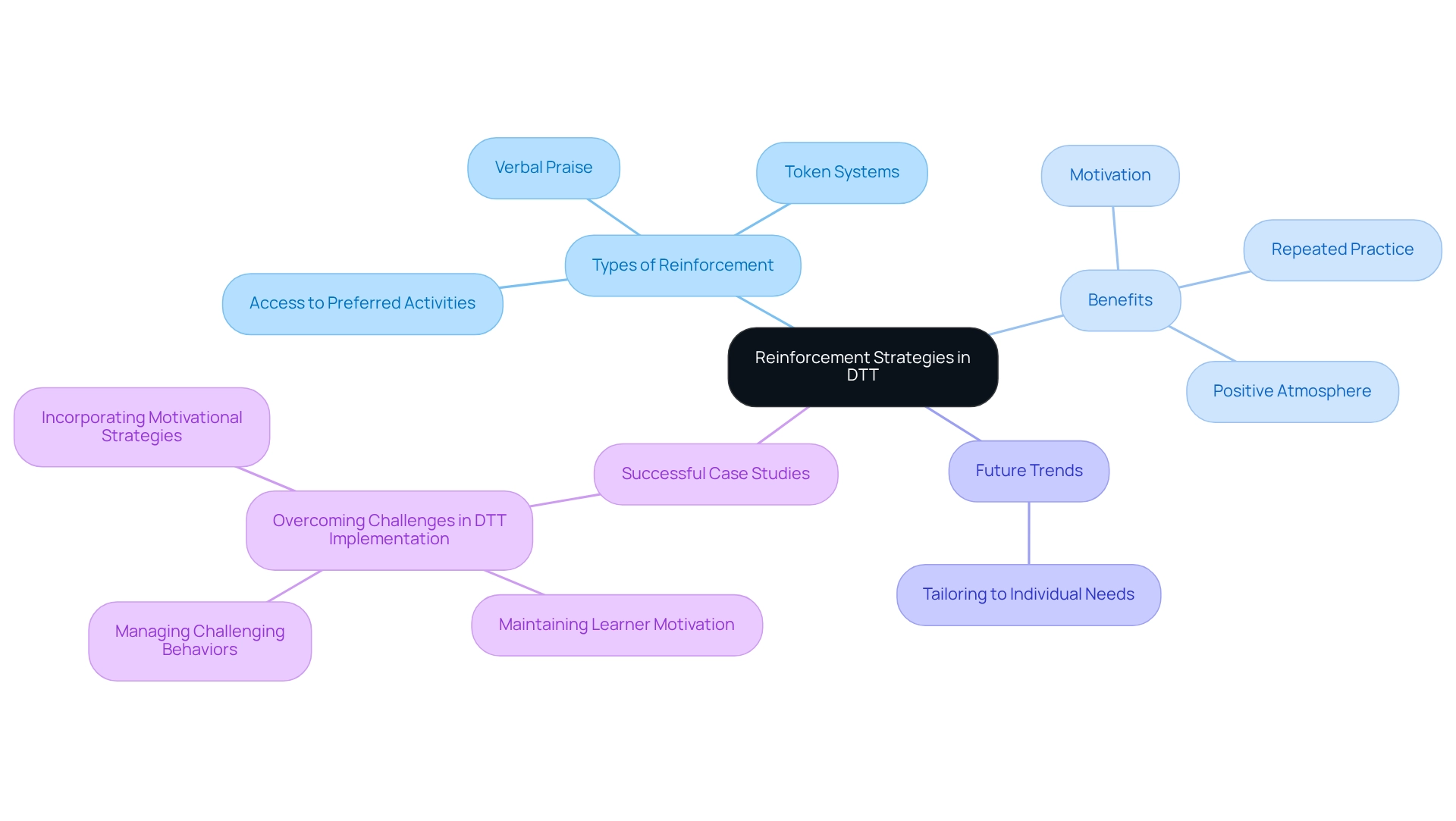
Skill Breakdown: Simplifying Learning Through Manageable Steps in DTT
A fundamental principle of discrete trials is task breakdown, which simplifies complex activities into smaller, manageable steps. This nurturing approach enables learners to focus on one component of a skill at a time, minimizing frustration and enhancing the likelihood of success. For example, when teaching a young child to tie their shoes, the process can be divided into distinct steps:
- Grasping the laces
- Forming a loop
- Tightening the laces
Recent studies indicate that this method not only fosters independence but also significantly reduces stress and anxiety for families, contributing to a more harmonious home environment. As ASD Media mentions, "As ongoing research keeps enhancing these techniques, ABA therapy serves as a symbol of hope for enhancing educational experiences and the overall quality of life for youngsters and their families."
Experts highlight that effective task breakdown is essential in discrete trials, as it enables customized learning experiences that address individual needs. The case study named 'Unlocking Independence: Problem-Solving Through ABA Therapy' demonstrates how task breakdown in discrete trials aids in promoting independence, indicating that children who participate in problem-solving training via ABA therapy exhibit a greater capacity to tackle challenges on their own.
By implementing these strategies, practitioners can create a supportive learning atmosphere that promotes positive change, aligning with the overarching goals of ABA therapy. Moreover, statistics show that families encounter reduced stress and anxiety from ABA therapy, resulting in a more tranquil home atmosphere. This highlights the beneficial effect of task breakdown in discrete trials, encouraging parents to explore these methods for the well-being of their children.
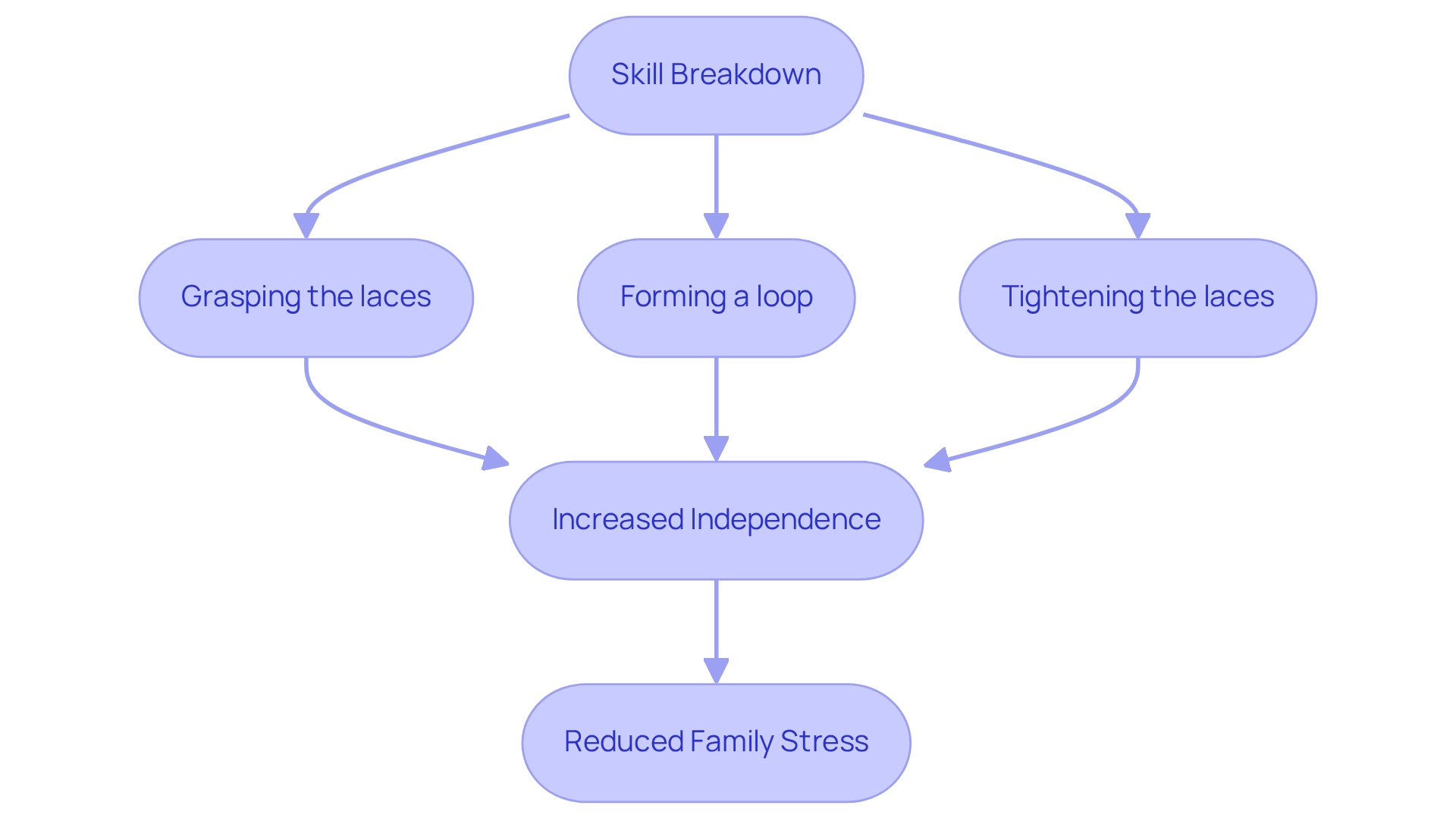
Generalization: Applying Skills Beyond Discrete Trials
Generalization is a vital skill for learners, allowing them to apply the abilities gained from discrete trials across various environments and situations. Imagine a child who learns to greet others in a structured setting; it’s essential that they can carry that skill into everyday life, whether at home or in school. To foster this generalization, therapists can introduce variability into teaching scenarios. This means practicing skills with different people and in diverse locations, reinforcing learned behaviors in real-life contexts.
Interestingly, research shows that 63% of autistic individuals excel in pattern recognition within certain areas. This unique ability can be harnessed by tailoring methods that align with these strengths, enhancing the application of techniques learned through discrete trials. Moreover, understanding the function of behavior is crucial. As highlighted in the Autism Academy 360 Podcast, educators equipped with strategies to address and modify behaviors can create environments that encourage the generalization of skills.
Temple Grandin insightfully states, "Autism provides a special opportunity to see things in new ways," reminding us of the valuable perspectives that can shape effective teaching strategies. By nurturing an environment that encourages the application of skills in various situations, therapists can significantly improve the effectiveness of ABA therapy.
To put these strategies into action, parent advocates can support practice in different settings and with a variety of individuals. This ensures that skills are not just learned but generalized effectively, empowering children to thrive in their everyday interactions.
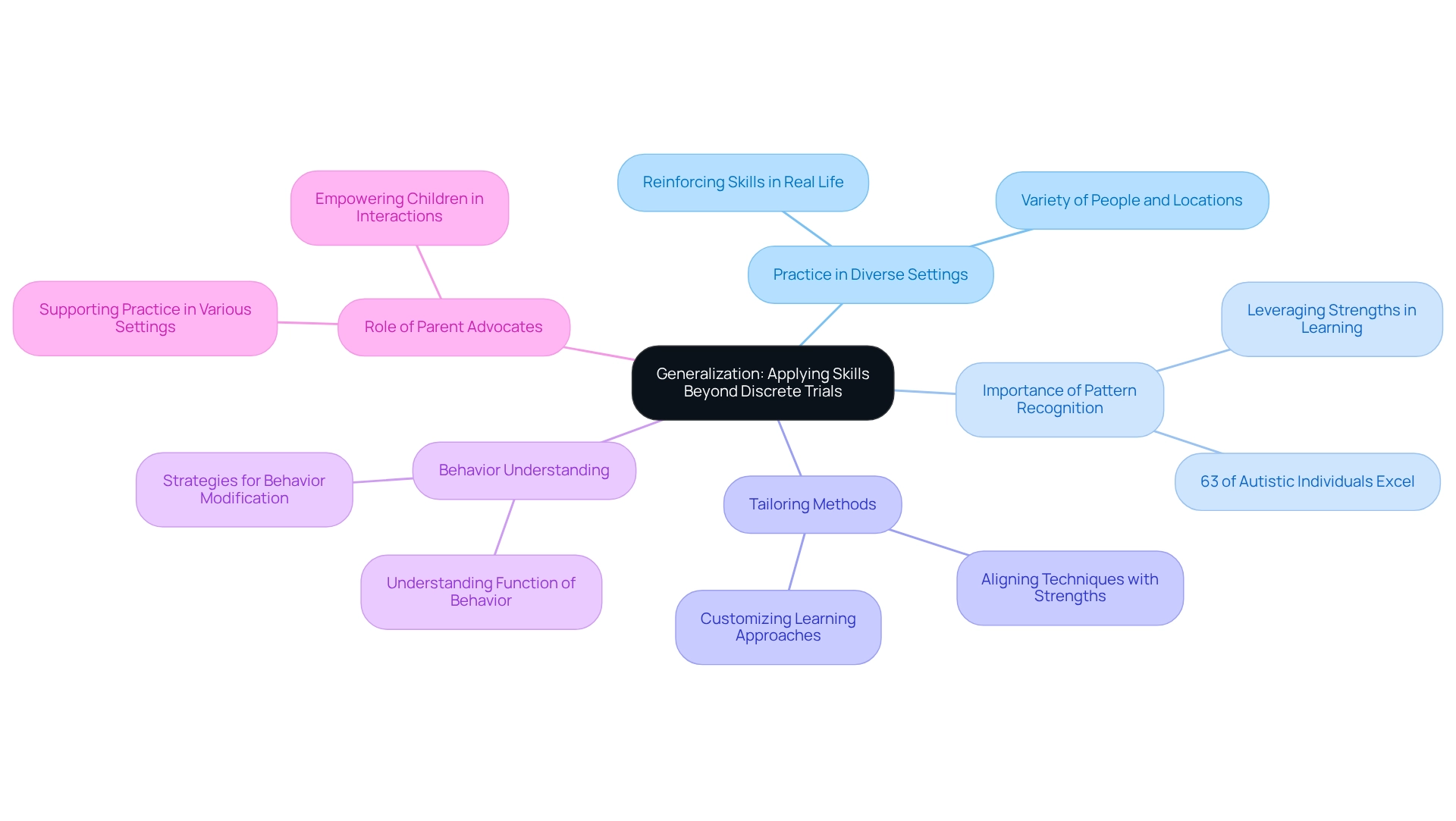
Collaborative Approaches: Integrating DTT with Other Therapies
Integrating discrete trials with other therapeutic approaches, such as speech and occupational therapy, offers a comprehensive support system for individuals with autism. This collaborative strategy allows therapists to address various developmental areas simultaneously, enhancing the effectiveness of interventions. Research shows that this integrated approach leads to positive outcomes, with studies revealing significant improvements across multiple developmental measures. A scoping review highlighted the positive effects of ABA across seven outcome measures, reinforcing the effectiveness of integrated approaches in ABA therapy.
Moreover, insights from professionals underscore the importance of teamwork. Merging DTT with additional therapies not only enriches the learning experience but also fosters a deeper understanding of each individual’s unique needs. Notably, nursery, portage, and DIR have shown little to no improvement compared to ABA treatment groups, emphasizing the advantages of ABA and its integration with other therapies.
Successful case studies illustrate how collaborative efforts can lead to remarkable progress in skill acquisition and behavioral management, empowering young individuals to thrive in various settings. As one researcher noted, "Some evidence from high-quality studies supports the effectiveness of specific early childhood interventions for improving certain outcomes." This highlights the significance of diverse research in evaluating the efficacy of various intervention approaches, reinforcing the necessity of integrating discrete trials alongside other therapies. By embracing this collaborative mindset, we can provide the best possible support for our children, ensuring they receive the care and understanding they deserve.
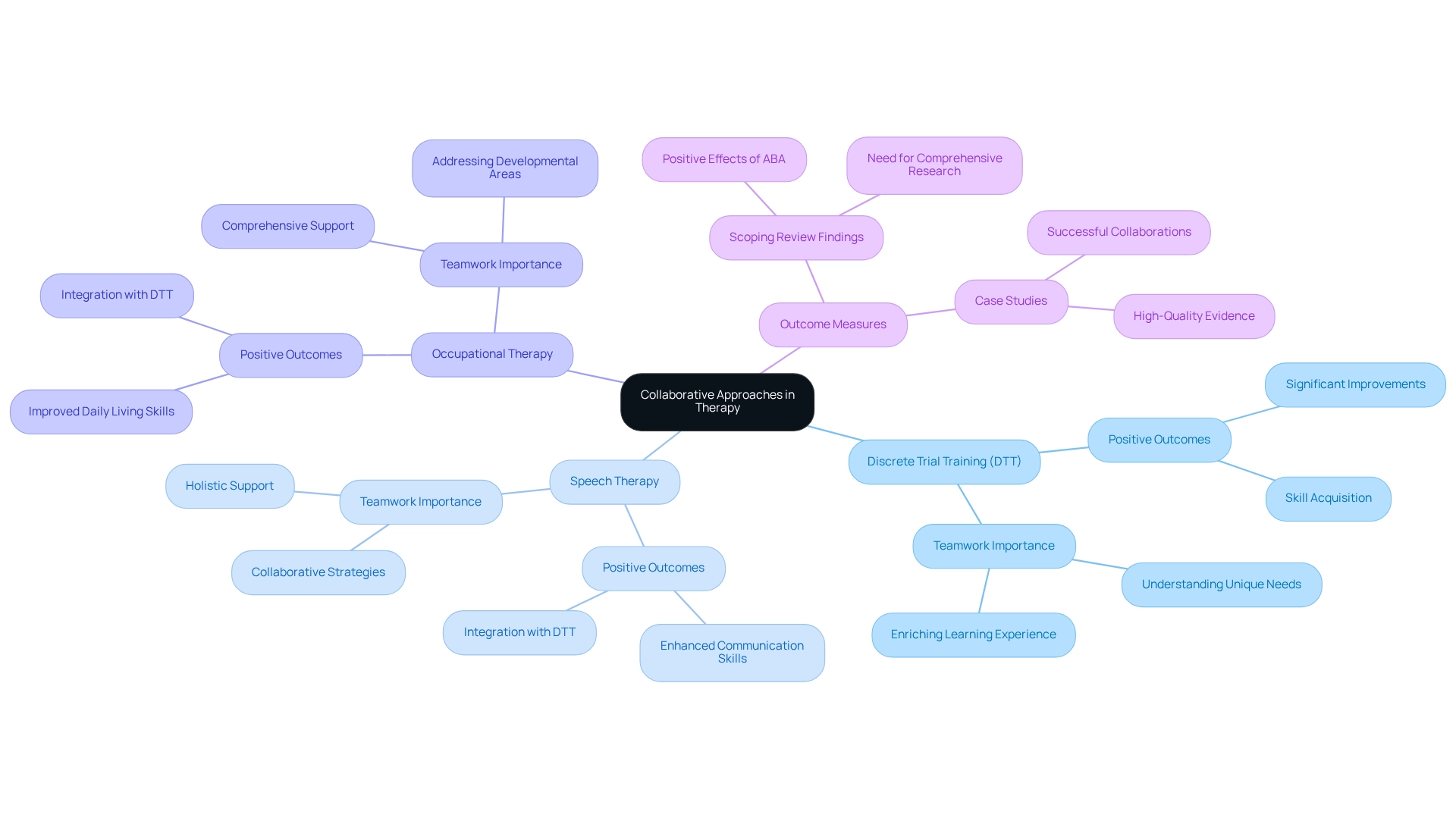
Overcoming Challenges: Solutions for Effective Discrete Trial Training Implementation
Implementing discrete trials can often feel daunting, especially when faced with learner resistance and challenges in maintaining attention. To effectively navigate these hurdles, therapists can embrace several supportive strategies. By varying the types of reinforcement, therapists can keep learners engaged, while integrating preferred activities into sessions can significantly boost motivation. It's essential to create a distraction-free learning environment to help maintain focus. Moreover, fostering regular communication with parents ensures that the strategies used at home align with those in therapy, promoting a consistent and enriching learning experience.
Recent findings underscore the importance of addressing learner resistance for successful outcomes in ABA therapy. A study on curricular revisions utilizing discrete trials revealed that incorporating this approach into existing curricula greatly enhanced engagement and learning results for individuals with autism. This insight suggests that practitioners can enrich their instructional methods by thoughtfully embedding discrete trials into their practices. By understanding how to effectively embed discrete trials, therapists can cultivate a more engaging learning experience that resonates with diverse learners.
As Harvey Blume wisely noted, "Neurodiversity may be every bit as crucial for the human race as biodiversity is for life in general." This statement beautifully emphasizes the necessity of recognizing and valuing diverse learning styles in ABA therapy. Additionally, statistics indicate that diverse thinking styles can lead to a 48% increase in innovation within collaborative teams, highlighting the value of varied approaches in DTT implementation.
Looking ahead to 2025, overcoming challenges in discrete trials remains a priority. Experts emphasize the significance of understanding the function of behavior to tailor interventions effectively. To empower parents, consider collaborating with therapists to implement these strategies at home, ensuring a supportive and effective learning atmosphere that unlocks the potential of individuals with autism and ADHD.
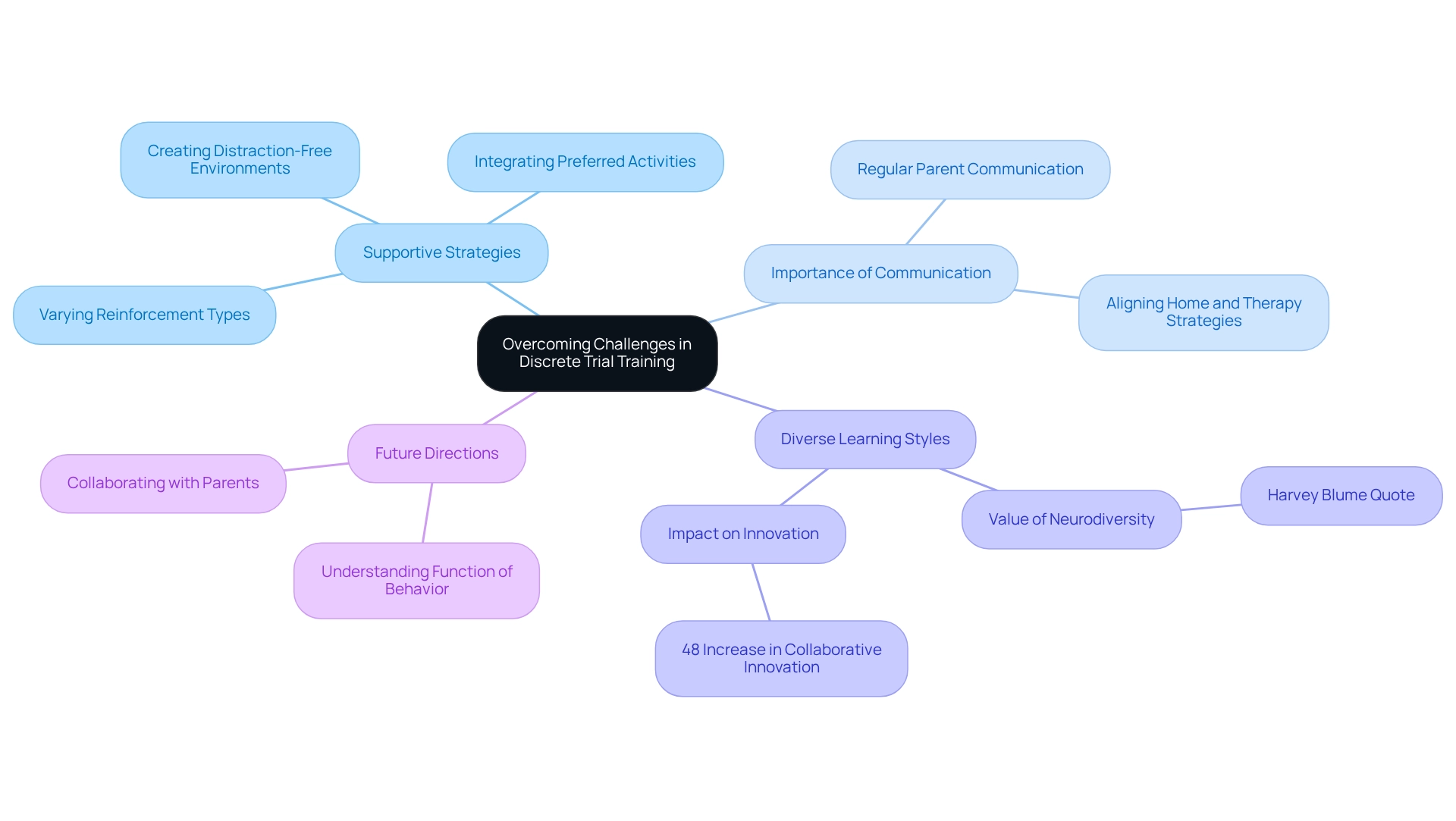
Adaptability: Customizing Discrete Trial Training for Diverse Learning Environments
Flexibility in discrete trials is essential for tailoring the learning experience to meet the unique needs and preferences of each child. This customization may involve:
- Adjusting the pace of instruction
- Altering task types
- Varying reinforcement strategies to boost engagement and effectiveness
It's concerning to note that recent research reveals fewer than half (46%) of children referred for ABA therapy continue for 24 months. This highlights the importance of ongoing assessment and personalized treatment plans to ensure therapy remains effective and relevant. By being attentive to a learner's progress and preferences, therapists can create a nurturing environment that fosters skill acquisition and retention.
As Karla Pretorius, M. Psych, wisely observes, 'ABA therapists would recommend starting with discrete trials at the beginning of a young person's program and then gradually progress towards Natural Environment Teaching (NET).' This balanced approach not only nurtures individual growth but also aligns with expert opinions advocating for customized ABA techniques to optimize outcomes for all learners.
To truly implement adaptability in DTT, it is vital for parents and professionals to regularly evaluate the child's progress and be open to adjusting strategies based on their evolving needs. Together, we can support our children in their learning journeys, ensuring they receive the most effective and compassionate care possible.
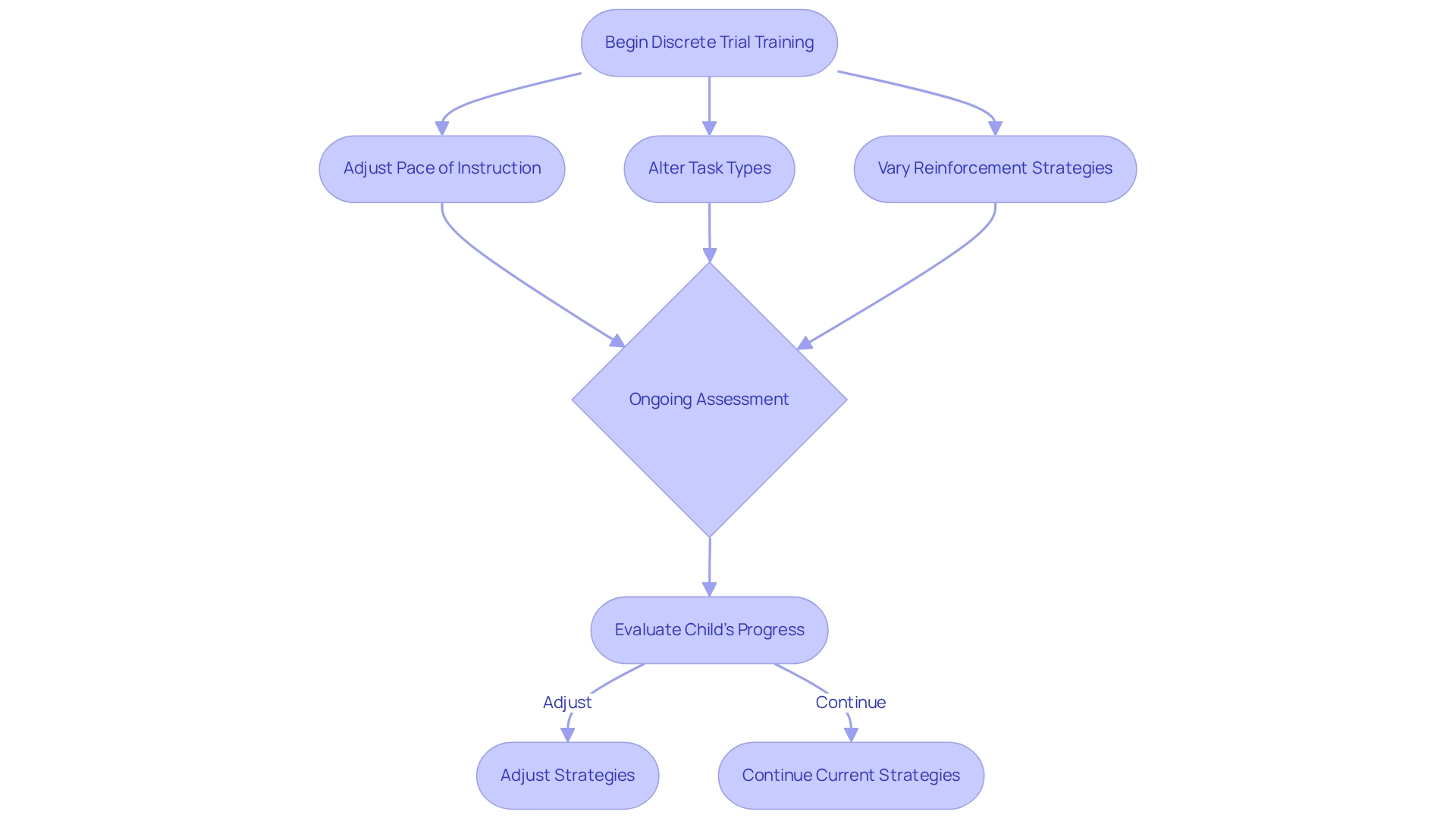
Long-Term Benefits: Fostering Independence and Social Skills Through DTT
The long-term advantages of discrete trials extend well beyond immediate ability acquisition; they play a crucial role in fostering independence and enhancing social abilities. As children engage in organized practice and receive regular reinforcement, they not only master fundamental skills but also build confidence in their capabilities. This newfound confidence translates into improved social interactions and greater independence in daily activities, equipping them for success in various life situations.
Studies show that successful DTT execution can lead to substantial improvements in a young person's overall quality of life, as skills acquired in therapy are applied in real-life situations. For instance, training initiatives that focus on enhancing parents' problem-solving abilities have proven to yield better outcomes for children, illustrating the importance of a nurturing atmosphere in the learning process. Moreover, the future possibilities of Applied Behavior Analysis (ABA) encompass broader applications in rehabilitation and skill acquisition, highlighting the adaptability of discrete trials. O. Ivar Lovaas famously stated, 'If they can't learn the way we teach, we teach the way they learn,' which underscores the flexibility of discrete trials in meeting individual needs. A case study titled 'Parent Training for Problem-Solving Abilities' demonstrates how such training can lead to improved results for young individuals, reinforcing the narrative of promoting independence and social skills.
By emphasizing autonomy and social skill development, DTT ensures that young individuals are equipped to navigate their environments with increased ease and confidence. Parents are encouraged to participate in training programs that enhance their skills, further supporting their children's growth. Together, we can create a supportive community that fosters learning and development for all children.
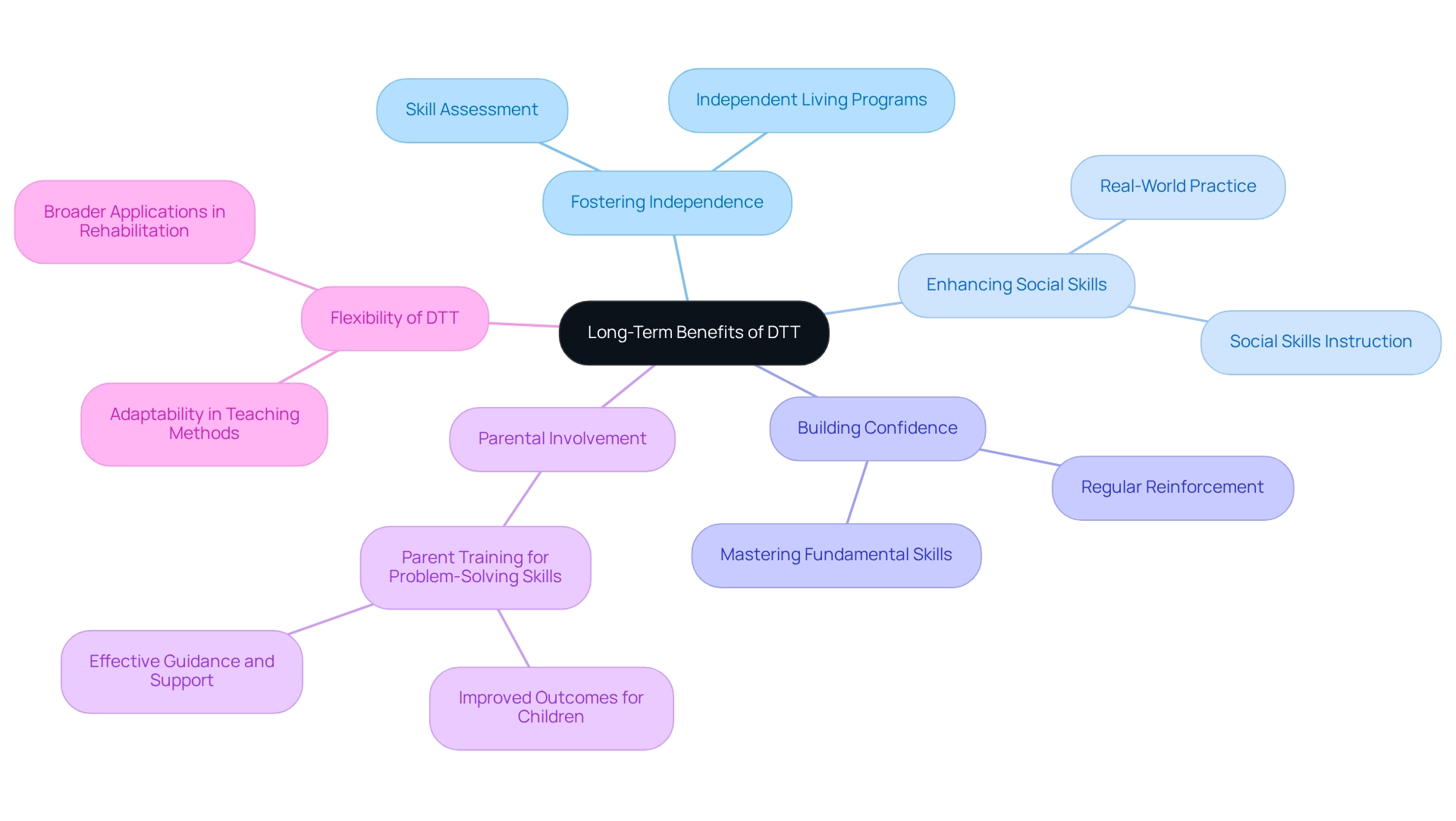
Conclusion
The exploration of Discrete Trial Training (DTT) reveals its profound impact on the learning and development of children with autism and ADHD. By breaking down skills into manageable steps, DTT not only enhances skill acquisition but also fosters independence and social interaction. This structured approach allows for clear tracking of progress, ensuring that interventions are tailored to each child's unique needs, ultimately leading to improved outcomes.
Furthermore, the integration of effective reinforcement strategies and adaptability in DTT practices amplifies its benefits. By customizing learning experiences and maintaining a focus on positive reinforcement, practitioners can create engaging and motivating environments that resonate with diverse learners. The collaborative nature of DTT, especially when combined with other therapeutic approaches, underscores the importance of a holistic support system that addresses various developmental areas.
Long-term, the advantages of DTT extend beyond immediate learning gains. As children build confidence through structured practice, they become better equipped to navigate social situations and daily challenges. This emphasis on fostering independence and social skills not only enhances the quality of life for children but also empowers families to support their growth effectively.
In conclusion, the transformative power of DTT in ABA therapy stands as a testament to the potential for positive change in the lives of children with autism and ADHD. By embracing tailored interventions, community support, and a commitment to continuous learning, parents and professionals alike can make a meaningful difference. Together, we can unlock the full potential of each child we serve, fostering a brighter future for them and their families.
Frequently Asked Questions
What is ASD Media's mission regarding ABA therapy?
ASD Media is committed to advancing the implementation of Applied Behavior Analysis (ABA) therapy using discrete trials, aiming to unlock the potential of youth with autism and ADHD through effective strategies that manage challenging behaviors and enhance social development.
What resources does ASD Media provide for families and professionals?
ASD Media offers a wealth of resources tailored for both parents and practitioners, including articles, guides, tools, and unlimited digital resources, fostering a supportive community for shared experiences and learning.
How does ASD Media support the community in the context of ABA therapy?
ASD Media cultivates a community that encourages collaboration and shared learning, emphasizing the importance of community support in enhancing the effectiveness of ABA therapy.
What is the significance of discrete trials in ABA therapy?
Discrete trials are a structured ABA method that breaks down abilities into small, manageable parts, allowing learners to focus on mastering each skill systematically, which enhances the learning experience and ability acquisition.
What evidence supports the effectiveness of discrete trials?
Studies indicate that structured learning methods like discrete trials show significant results, with only 0% to 13% of study records indicating no change, highlighting their effectiveness in the lives of learners.
How does progress tracking work in discrete trials?
Progress tracking in discrete trials involves data collection methods such as frequency counts and percentage correct, allowing therapists to monitor learners' responses and guide necessary modifications to teaching strategies.
What challenges might families face when implementing discrete trials?
Implementing discrete trials can require significant time and resources, which may not be feasible for every family. Therefore, a balanced strategy that includes spontaneous communication opportunities is recommended.
What recent findings highlight the effectiveness of structured data collection in DTT?
Recent findings show that students can successfully request an object in 8 out of 10 trials, demonstrating the potential of structured data collection in enhancing skill acquisition.




